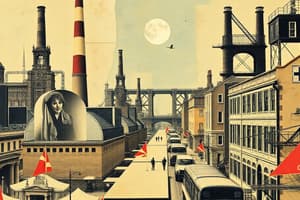Podcast
Questions and Answers
What was the primary purpose of Thomas Newcomen's invention in 1712?
What was the primary purpose of Thomas Newcomen's invention in 1712?
- To improve the lives of factory workers
- To link cloth manufacturing to water and steam power
- To increase spinning efficiency
- To pump water out of coal mines (correct)
What was the result of the new inventions and technological innovations in the Industrial Revolution?
What was the result of the new inventions and technological innovations in the Industrial Revolution?
- Cheaper products meeting the growing demand for goods (correct)
- A decrease in the demand for goods
- A decrease in the use of coal as an energy source
- An improvement in the working conditions of factory workers
Why did factory owners prefer to employ children in factories?
Why did factory owners prefer to employ children in factories?
- Because they were cheaper to hire and could reach parts of the machines (correct)
- Because they were more obedient and easier to control
- Because they were stronger than adults
- Because they were more skilled than adults
What was the average working hours of factory workers per week?
What was the average working hours of factory workers per week?
What was the main reason for the growth of industrial activity in the Midlands and the North?
What was the main reason for the growth of industrial activity in the Midlands and the North?
What was the condition of the housing provided for factory workers in the 'mushroom towns'?
What was the condition of the housing provided for factory workers in the 'mushroom towns'?
What was the primary result of the agricultural revolution in 18th century Britain?
What was the primary result of the agricultural revolution in 18th century Britain?
What was the consequence of increased food production in 18th century Britain?
What was the consequence of increased food production in 18th century Britain?
Which industry flourished in 18th century Britain due to the introduction of machine-made goods?
Which industry flourished in 18th century Britain due to the introduction of machine-made goods?
What was a major factor contributing to the growth of the textile industry in 18th century Britain?
What was a major factor contributing to the growth of the textile industry in 18th century Britain?
What was a consequence of the rise in consumer demand in 18th century Britain?
What was a consequence of the rise in consumer demand in 18th century Britain?
What marked the beginning of mass consumption in 18th century Britain?
What marked the beginning of mass consumption in 18th century Britain?
Study Notes
Economic Change in Britain
- At the end of the 18th century, Britain underwent significant economic changes that transformed the country from an agrarian to an industrialized nation.
- The agricultural revolution in the 18th century transformed traditional farming, leading to increased food production and population growth.
- New farming techniques, such as land enclosure and soil care, led to increased cereal production and livestock breeding.
Industrialization and Mass Consumption
- Increased food production and population growth led to greater consumer demand and industrial demand, marking the beginning of mass consumption.
- The demand for goods like wardrobes, clocks, and kitchen utensils grew, as did the consumption of pleasure goods like tobacco, tea, coffee, sugar, and alcohol.
- The textile and cloth-making industry flourished, with cotton being a leading sector of industrialization.
Technological Innovation
- The Industrial Revolution was made possible by a series of technological innovations that transformed and improved productivity.
- Key inventions included:
- Thomas Newcomen's steam engine (1712) for pumping water out of coal mines
- James Watt's steam engine (1765) and condenser (1769) for improved efficiency
- James Hargreaves's spinning jenny (ca 1764) for increased spinning efficiency
- Edmund Cartwright's loom (1787) for linking cloth manufacturing to water and steam power
- These innovations led to cheaper products meeting growing demand, heavier investment in technological development, and a focus on energy generated from coal.
Workers' Lives
- Factory workers were paid low wages, barely covering rent and food, and worked 65-70 hours per week in harsh conditions.
- Workers lived in 'mushroom towns' with poor living conditions, lack of basic public services, and pollution.
- Many working-class families relied on children's income, who were employed for lower wages and ease of control.
- Physical abuse was common in factories, where supervisors controlled and punished workers.
Child Labor
- Children's pay was estimated to be 10-20% of an adult's wage, making them attractive to factory owners.
- Children were employed for their small size, which allowed them to repair machines and work in coal mines.
- Physical abuse was common, with supervisors punishing children for lateness and other infractions.
Studying That Suits You
Use AI to generate personalized quizzes and flashcards to suit your learning preferences.
Description
This quiz covers the significant economic changes that took place in Britain during the 18th century, transforming the country from an agrarian to an industrialized nation.




